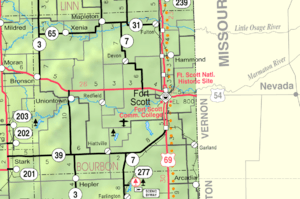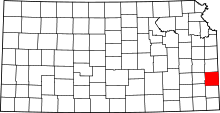Uniontown, Kansas
| Uniontown, Kansas | |
|---|---|
| City | |
 Location within Bourbon County and Kansas | |
 KDOT map of Bourbon County (legend) | |
| Coordinates: 37°50′50″N 94°58′33″W / 37.84722°N 94.97583°WCoordinates: 37°50′50″N 94°58′33″W / 37.84722°N 94.97583°W | |
| Country | United States |
| State | Kansas |
| County | Bourbon |
| Area[1] | |
| • Total | 0.22 sq mi (0.57 km2) |
| • Land | 0.22 sq mi (0.57 km2) |
| • Water | 0 sq mi (0 km2) |
| Elevation | 896 ft (273 m) |
| Population (2010)[2] | |
| • Total | 272 |
| • Estimate (2012[3]) | 268 |
| • Density | 1,236.4/sq mi (477.4/km2) |
| Time zone | Central (CST) (UTC-6) |
| • Summer (DST) | CDT (UTC-5) |
| ZIP code | 66779 |
| Area code(s) | 620 |
| FIPS code | 20-72525 [4] |
| GNIS feature ID | 0474755 [5] |
Uniontown is a city in Bourbon County, Kansas, United States. As of the 2010 census, the city population was 272.[6]
History
A post office was established in 1856 about two miles east of the present town. Uniontown was moved to its present site about 1865.[7] The early settlers being loyal to the Union in the Civil War caused the name to be selected.[8]
Geography
Uniontown is located at 37°50′50″N 94°58′33″W / 37.84722°N 94.97583°W (37.847264, -94.975922),[9] along the Marmaton River. According to the United States Census Bureau, the city has a total area of 0.22 square miles (0.57 km2), all of it land.[1]
Climate
The climate in this area is characterized by hot, humid summers and generally mild to cool winters. According to the Köppen Climate Classification system, Uniontown has a humid subtropical climate, abbreviated "Cfa" on climate maps.[10]
Demographics
| Historical population | |||
|---|---|---|---|
| Census | Pop. | %± | |
| 1880 | 136 | — | |
| 1890 | 344 | 152.9% | |
| 1900 | 293 | −14.8% | |
| 1910 | 256 | −12.6% | |
| 1920 | 300 | 17.2% | |
| 1930 | 298 | −0.7% | |
| 1940 | 277 | −7.0% | |
| 1950 | 232 | −16.2% | |
| 1960 | 211 | −9.1% | |
| 1970 | 286 | 35.5% | |
| 1980 | 371 | 29.7% | |
| 1990 | 290 | −21.8% | |
| 2000 | 288 | −0.7% | |
| 2010 | 272 | −5.6% | |
| Est. 2015 | 268 | [11] | −1.5% |
| U.S. Decennial Census | |||
2010 census
As of the census[2] of 2010, there were 272 people, 120 households, and 66 families residing in the city. The population density was 1,236.4 inhabitants per square mile (477.4/km2). There were 142 housing units at an average density of 645.5 per square mile (249.2/km2). The racial makeup of the city was 96.0% White, 0.7% African American, 0.7% Native American, 0.4% Asian, 0.7% from other races, and 1.5% from two or more races. Hispanic or Latino of any race were 0.7% of the population.
There were 120 households of which 30.0% had children under the age of 18 living with them, 39.2% were married couples living together, 10.0% had a female householder with no husband present, 5.8% had a male householder with no wife present, and 45.0% were non-families. 45.0% of all households were made up of individuals and 22.5% had someone living alone who was 65 years of age or older. The average household size was 2.27 and the average family size was 3.20.
The median age in the city was 37.4 years. 27.2% of residents were under the age of 18; 7% were between the ages of 18 and 24; 22.8% were from 25 to 44; 25.8% were from 45 to 64; and 17.3% were 65 years of age or older. The gender makeup of the city was 45.2% male and 54.8% female.
2000 census
As of the census[4] of 2000, there were 288 people, 120 households, and 72 families residing in the city. The population density was 1,337.6 people per square mile (505.4/km²). There were 138 housing units at an average density of 640.9 per square mile (242.2/km²). The racial makeup of the city was 97.22% White, 0.35% African American, 1.04% Native American, 0.35% from other races, and 1.04% from two or more races. Hispanic or Latino of any race were 1.39% of the population.
There were 120 households out of which 28.3% had children under the age of 18 living with them, 46.7% were married couples living together, 10.8% had a female householder with no husband present, and 40.0% were non-families. 38.3% of all households were made up of individuals and 22.5% had someone living alone who was 65 years of age or older. The average household size was 2.24 and the average family size was 2.97.
In the city the population was spread out with 24.7% under the age of 18, 9.4% from 18 to 24, 16.3% from 25 to 44, 22.2% from 45 to 64, and 27.4% who were 65 years of age or older. The median age was 45 years. For every 100 females there were 85.8 males. For every 100 females age 18 and over, there were 82.4 males.
The median income for a household in the city was $25,417, and the median income for a family was $33,229. Males had a median income of $21,667 versus $19,464 for females. The per capita income for the city was $13,283. About 12.3% of families and 14.1% of the population were below the poverty line, including 14.5% of those under the age of eighteen and 9.7% of those sixty five or over.
Education
Ełementary and secondary education
Public education for early childhood, elementary and secondary school students is provided by:
- Unified School District 235, which leads to graduation from Uniontown High School
In 1999, four students at the local high school started the Life in a Jar project honoring Irena Sendler, a Polish humanitarian who rescued over 2500 Jewish children from the Warsaw Ghetto during World War II. The project spread internationally and brought fame to a little-known story of heroism.[12]
Further reading
References
- 1 2 "US Gazetteer files 2010". United States Census Bureau. Archived from the original on January 24, 2012. Retrieved 2012-07-06.
- 1 2 "American FactFinder". United States Census Bureau. Retrieved 2012-07-06.
- ↑ "Population Estimates". United States Census Bureau. Archived from the original on June 17, 2013. Retrieved 2013-05-29.
- 1 2 "American FactFinder". United States Census Bureau. Archived from the original on September 11, 2013. Retrieved 2008-01-31.
- ↑ "US Board on Geographic Names". United States Geological Survey. 2007-10-25. Retrieved 2008-01-31.
- ↑ "2010 City Population and Housing Occupancy Status". U.S. Census Bureau. Archived from the original on July 21, 2011. Retrieved March 6, 2011.
- ↑ Blackmar, Frank Wilson (1912). Kansas: A Cyclopedia of State History, Volume 2. Standard Publishing Company. p. 826.
- ↑ Capace, Nancy (1 June 2000). Encyclopedia of Kansas. North American Book Dist LLC. p. 282. ISBN 978-0-403-09312-0.
- ↑ "US Gazetteer files: 2010, 2000, and 1990". United States Census Bureau. 2011-02-12. Retrieved 2011-04-23.
- ↑ Climate Summary for Uniontown, Kansas
- ↑ "Annual Estimates of the Resident Population for Incorporated Places: April 1, 2010 to July 1, 2015". Retrieved July 2, 2016.
- ↑ Life in a Jar - The Irene Sendler Story Archived May 17, 2008, at the Wayback Machine., Milken Family Foundation, reproduced with permission by the Turner Foundation, 2002. Accessed 2007-10-13.
External links
| Wikimedia Commons has media related to Uniontown, Kansas. |
- City
- Schools
- USD 235, local school district
- Maps
- Uniontown City Map, KDOT
